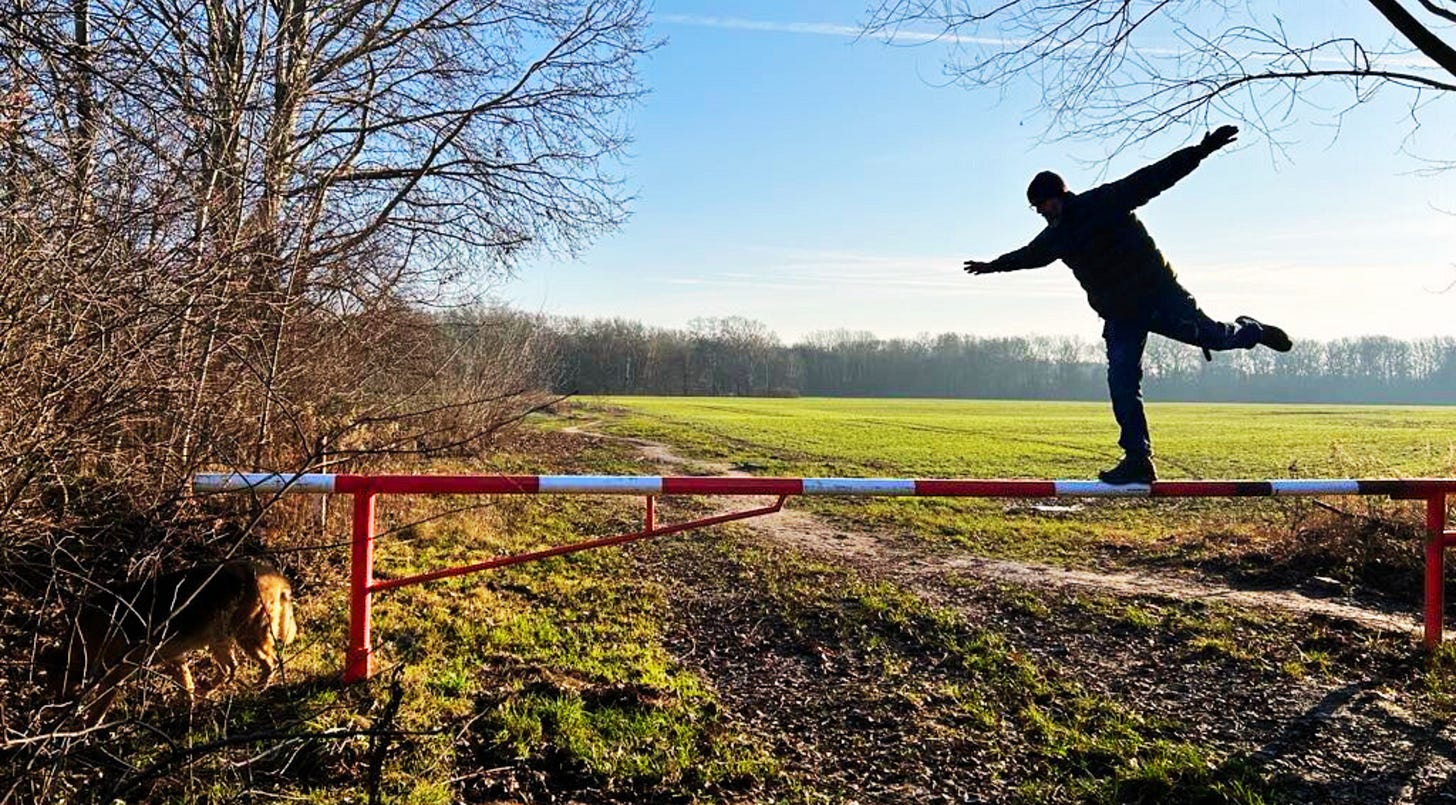Walking the Wire of the Unanticipated
Balance is important in my life, and that’s not a metaphor. When walking my dog by my home, I pass heavy metal gates which block cars from entering the farmer’s fields. Each time I reach a gates, I give myself one chance to walk upon the metal beam; turning, standing on one leg, wobbling, and returning until I fall to the ground. Once I fall the game is over, and I don’t allow myself to try again until the next time I pass the gate. My self-imposed rule creates an impulse to try my very best, I’ve only got one shot to impress myself with my performance. When I fall (which I always do), I laugh off my disappointment, telling myself that ‘Next time I’ll be even more amazing!’.
This is a game I play with myself because it’s fun, and because I want to improve my balance. I’m also testing a hypothesis that, if my body understands the principle of balance then this innate understanding will also facilitate balance in the cognitive and emotional dimensions of my life. Does a learned competency for physical balance translate across the other domains of one’s life?
This is one of many example of how I incorporate play into my life. When I began this practice about ten years ago, it required constant effort to find ways to turn my normal activities into micro games; now, these games find me throughout the day. In each little game I seeks to develop a skill, achieve a goal, apply knowledge, or test a claim. I might get up from the dinner table to hunt down a mouthful of fibre from the fridge before allowing myself to eat whatever else is on my plate (‘Fibre first!’). When doing the dishes, I might stretch out my hamstrings by placing one foot on the kitchen counter, like a ballet dancer on a barre, while putting away the plates. I once listened to Tom Waits, I Want You, on repeat about thirty times in a row, because I didn’t want to change the energy and emotional tone of a segment of my writing by changing the song.
I’m serious. No, wait, Now I’m serious.
I try to maintain a ‘posture of play’ in all aspects of my life. Play does not infer silliness, although I am not afraid to be a little silly if the occasion arises; rather, play breaks the convention of routine and animates mundane aspects of life, allowing a certain lightness of heart and improvisation to penetrate monotony. It is also a conscious choice to push back against the grave seriousness that creeps into my conduct. Play becomes an act of resistance against furrow-browed ‘professionals’, barking at the world through cemented faces, intent on transforming the magic of life into suffering for them and all those around.
I perform at my best, in all aspects of my life, when I am full of joy. This posture of play does not mean that I am not serious about the quality and professionalism of my work, I hold myself to a very high standard. Instead, play is a conscious choice to nurture my inner child, to optimise for self-expression, to develop in times of transition, and to break out of the grooves and ruts which produce constrained, predictable behaviour.
How can I play thee? Let me count the ways.
My posture of play has come to lay at the core of my approach to learning. At a certain point in my life, learning had become equated with drudgery. Once I began to play again, giving myself permission to laugh at my mistakes, to fail without self-punishment, and to train joy back into my process, learning awoke in the most profound ways. My perception of time changed, the barrier to entering focussed work melted away, and laughter rose from the pit of my belly into the surface of my throat, ready to escape at the most unexpected times.
Play is in Detention
In my experience of school, laughter and play have largely been evicted from the high school classroom. As a younger student, I cannot count the number of times I was sent to the Principle’s Office because I couldn’t restrain my joie de vivre. ‘Back to work!’ has become the mantra of frustrated teachers demanding attention with an iron fists.
Policing joy only encourages outbursts of repressed humour, and the prohibition of humour in the classroom creates conditions for resentment against teachers and distain towards learning. When our schools become indoctrinated by an ethos of seriousness, is it surprising that students fail to find wonder in the process of learning?
Play Applied in My Classroom
In my classroom, I give clear instructions to play. I provide a framework for what a posture of play means as a methodology for learning and give space to experiment. I lead by example, often directing the flow of the work into spontaneous games or playful conversations. In doing so, I give permission for my students to introduce their own games.
In the midst of this play, some of the most wonderful moments arise. A week ago, during the final class before the winter break, I told my students in The Dojo that they were responsible for the ‘lesson plan’. Students brought in random craft materials and we made bracelets, Christmas cards, and painted mini gingerbread cookies. The facilitation of randomness evolved into the creation of a ‘class photo’, miniature gingerbread likenesses for each student in the class. It was silly but fun, non-essential but meaningful, and in the spirit of the holiday season.
Softening the Soil of the Heart
At the start of the year, plays sometimes finds expression in awkward ways; silliness rather than creativity, exclusion rather than inclusion, distraction rather than passionate intensity. Over time, students come to understand the method and contribute in their unique ways. Eventually, joy becomes an integral part of the lesson plan.
For some students, even from the early age of thirteen and fourteen, the ability to play seems to have been sacrificed upon the alter of good behaviour. When all around are enjoying themselves, some students are locked within, paralysed by the freedom of self-expression. In such individuals, I find it heart-warming when involuntary smiles begin to break through their armour, sparkles replace the dullness in their eyes, and the soil of their hearts begins to soften. For others, a little play is too much to handle, having resigned themselves to grave sobriety for life.






What a beautiful piece of writing! I am 💯 behind your embrace of play. We do take ourselves too seriously and in higher ed I find that students are taken aback by the playful moments I offer them. Can they take a Professor seriously, when she offers custom made stickers and games? Unconventional assignments instead of stuffy literature reviews? Those who take a chance on the unexpected end up learning so much more though. A playful spirit is a powerful one.